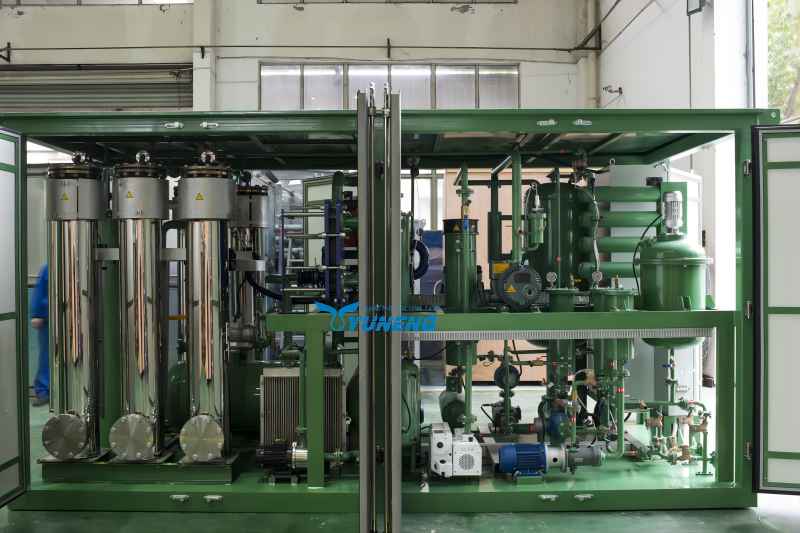The Role of a Transformer Oil Regeneration Plant in Modern Sector
The Role of a Transformer Oil Regeneration Plant in Modern Sector
Blog Article
Why Regenerated Transformer Oil Is Important for Reliable Power Systems
The vital role of regenerated transformer oil in ensuring the dependability of power systems can not be overstated. By restoring the oil's fundamental chemical and physical properties, the regrowth process considerably enhances its dielectric strength and thermal efficiency.
Significance of Transformer Oil
Transformer oil plays a crucial function in the reliable operation of electric transformers. By providing thermal conductivity, transformer oil dissipates warm created during electrical procedure, which is crucial for preserving optimal operating temperature levels and prolonging the lifespan of the equipment.
Moreover, transformer oil serves as an obstacle versus moisture and air, which can result in oxidation and deterioration of transformer products. The existence of pollutants in the oil can significantly hinder its protecting residential properties, causing functional ineffectiveness and potential equipment failure. Regular tracking and maintenance of transformer oil are as a result essential to guaranteeing the proceeded efficiency of transformers.
The top quality and composition of transformer oil are extremely important, as they directly influence the integrity and efficiency of the electric systems in which they run. Recognizing the significance of transformer oil is important for industries and utilities reliant on durable power facilities, stressing the requirement for reliable administration and regeneration procedures to preserve oil stability in time.
Benefits of Regrowth Process

Additionally, the regrowth process alleviates the destruction of oil, which can cause raised oxidation and acid development. This not just improves the dependability of the oil but also reduces the threat of transformer failures because of insulation malfunction. The enhanced top quality of regenerated oil permits transformers to run at optimum degrees, eventually causing boosted energy efficiency and lowered functional costs.
Additionally, the regeneration process adds to keeping the total health of the power system. Transformers can run longer without the requirement for oil substitute, hence lessening downtime and maintenance efforts. In recap, the regrowth procedure supplies substantial advantages by boosting the durability and performance of transformer oil, making sure that power systems operate accurately and effectively in time.
Ecological Impact and Sustainability
The regrowth process of transformer oil substantially minimizes environmental worries linked with oil disposal and waste administration. Conventional disposal methods for used transformer oil position significant dangers, including dirt contamination and water pollution. By regrowing oil, these dangers are markedly lowered, as the procedure recycles existing resources rather than adding to waste build-up.
Furthermore, regenerated transformer oil can be reused in numerous applications, which advertises a round economic situation. This not just lessens the demand for virgin oil extraction-- a process that can be ecologically damaging-- yet also conserves natural sources. The regrowth process itself utilizes innovative filtration and filtration techniques that remove dangerous contaminants, ensuring that the end product satisfies or exceeds industry criteria for efficiency and safety.

Enhancing Transformer Performance
Considerable enhancements in transformer efficiency can be accomplished through the usage of regenerated transformer oil. This oil, produced via innovative filtration procedures, considerably improves the electrical insulation residential properties of transformers. By removing contaminations and impurities that commonly compromise efficiency, restored oil makes sure remarkable dielectric strength, decreasing the danger of electric failures.
Additionally, regenerated transformer oil shows improved thermal conductivity, which assists in effective warmth dissipation. This particular is important for preserving optimal operating temperature levels, thus lengthening the lifespan of transformers and reducing the likelihood of getting too hot - Transformer Oil Regeneration. Enhanced thermal administration also contributes to the overall integrity of power systems
Furthermore, the chemical stability of restored oil avoids the formation of corrosive acids and sludge, which can adversely influence transformer components. By keeping a cleaner interior environment, this oil lessens maintenance needs and prolongs service intervals.
Cost-Effectiveness and Efficiency
In terms of cost-effectiveness and effectiveness, regenerated transformer oil presents a compelling alternative to conventional oils. The regeneration process not just gets rid of impurities but also restores the oil's initial residential or commercial properties, extending its practical life expectancy. This long life translates right into reduced regularity of oil substitute, therefore lowering functional prices with time.
In addition, the use of restored oil can substantially decrease power losses connected with inefficient protecting liquids. Its superior dielectric homes ensure optimal efficiency, improving the dependability of power systems. Because of this, services benefit from reduced upkeep expenses and decreased downtime, promoting a more reliable operational environment.

Final Thought
In final thought, the regeneration of transformer oil plays an essential function in ensuring click here now the dependability and performance of power systems. By recovering the important chemical and physical residential properties of the oil, this process enhances dielectric strength and thermal conductivity, ultimately lowering the risk of Go Here insulation breakdown. The environmental advantages associated with reusing resources add to sustainability efforts, while cost-effectiveness and boosted efficiency emphasize the need of making use of regenerated transformer oil in modern electrical framework.
Transformer oil plays a critical duty in the reliable operation of electric transformers. Routine tracking and upkeep of transformer oil are as a result crucial to guaranteeing the continued performance of transformers.
The regrowth process of transformer oil dramatically minimizes environmental problems associated with oil disposal and waste administration. By lengthening the lifecycle of transformer oil, the power and resources generally eaten in producing brand-new oil are considerably lowered.Significant improvements in transformer performance can be attained via the use of regenerated transformer oil.
Report this page